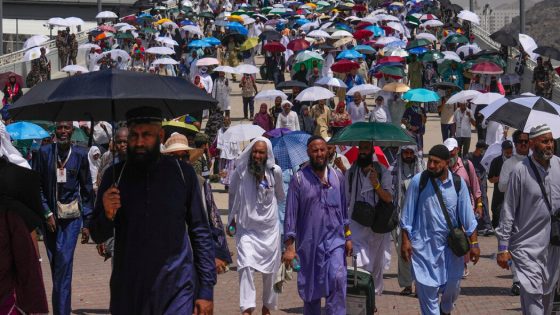The deaths of more than a thousand pilgrims in Saudi Arabia for the hajj have put a spotlight on an underworld of illicit tour operators, smugglers and swindlers who profit off Muslims desperate to meet their religious duty to travel to Mecca.
While registered pilgrims are transported around the shrines in air-conditioned buses and rest in air-conditioned tents, undocumented ones are often exposed to the elements, making them more vulnerable to extreme heat. Some pilgrims this year described watching people faint and passing bodies in the street as temperatures hit 120 degrees or higher.
On Sunday, in an interview on state television, the Saudi health minister, Fahd al-Jalajel, said that 83 percent of the more than 1,300 deaths occurred among pilgrims who had not had official permits.
“The rise in temperatures during the hajj season represented a big challenge this year,” he said. “Unfortunately — and this is painful for all of us — those who didn’t have hajj permits walked long distances under the sun.”
Mr. al-Jalajel’s remarks came after days of silence from the Saudi authorities over the fatalities, during the hajj, an arduous and deeply spiritual ritual that capable Muslims are encouraged to perform in their lifetimes.
With nearly two million pilgrims participating each year, many of them elderly or ailing, it is not unusual for people to die from heat stress, illness or chronic disease, and Saudi Arabia does not regularly report those statistics. So it is unclear if the number of deaths this year was unusual. Last year, 774 pilgrims died from Indonesia alone, and in 1985, more than 1,700 people died around the holy sites, most of them from heat stress, a study at the time found.
But because so many of the pilgrims who died this year were performing the pilgrimage without official documentation, their deaths exposed the underworld of unlicensed tour operators, smugglers and swindlers who take advantage of pilgrims desperate to perform the hajj, helping them evade the regulations.
“There’s so much greed around this business,” said Iman Ahmed, co-owner of El-Iman Tours in Cairo.
Ms. Ahmed said that she refused to send unregistered pilgrims on hajj packages but that other Egyptian tour operators and Saudi brokers made big money doing so.
More than 1.8 million pilgrims registered officially for the hajj this year. But about 400,000 more tried to make the trip without the required documents, a senior Saudi official told the news agency Agence France-Presse, speaking on the condition of anonymity. That would mean that nearly one in five of this year’s pilgrims bypassed the kingdom’s restrictions, including a security cordon around Mecca that locks down weeks ahead of hajj.
Several countries that recorded large numbers of pilgrim deaths have moved quickly to address the fallout over the past few days.
In Egypt, the authorities said that they would revoke the licenses of 16 companies that issued “unofficial” visas to hopeful pilgrims without providing them with adequate services.
In Tunisia, which counted more than 50 people among the dead, the president on Friday fired the country’s religious affairs minister.
And in Jordan, which recorded the deaths of at least 99 pilgrims, the public prosecutor opened an investigation into illegal hajj routes and the people profiting from them.
In interviews with The New York Times, hajj tour operators, pilgrims and relatives of the dead said the number of undocumented pilgrims appeared to have been driven up by rising economic desperation in countries like Egypt and Jordan. An official hajj package can cost more than $5,000 or $10,000, depending on a pilgrim’s country of origin — far beyond the means of many hoping to make the trip.
But they also described easily exploited loopholes in Saudi Arabia’s regulations that allowed undocumented pilgrims to travel to the kingdom with a tourist or visitor visa several weeks ahead of hajj. Once they arrive, they find a network of illegal brokers and smugglers who offer their services, take their money and sometimes abandon them to fend for themselves, they said.
Saudi officials did not respond to a request for comment.
Among those who fell into that trap was Safaa al-Tawab, from the Egyptian city of Luxor.
Ms. al-Tawab, 55, had not been able to obtain a hajj permit but found an Egyptian tour company that offered to take her for around $3,000, said her brother, Ahmed al-Tawab.
He said she had not understood that she was violating the rules when she traveled to Saudi Arabia last month.
After she arrived, she told relatives that she had been put in inadequate housing and prevented from going outside by the tour operator. While the company had promised to provide air-conditioned buses to transport the pilgrims around Mecca, she instead found herself walking for miles in the sun to reach the holy sites, Mr. al-Tawab said.
His sister died midway through the pilgrimage, but when he contacted the tour company, it assured him that she was fine. When the company representative learned that her relatives knew about her death, he turned off his phone, Mr. al-Tawab said.
“Pilgrims were deceived,” Mahmoud Qassem, a member of Egypt’s Parliament, said in a request for information from government officials.
“They left them all alone to face their own destiny,” Mr. Qassem said of the tour companies.
Reporting was contributed by Hager ElHakeem, Rana F. Sweis, Zia ur-Rehman, Saif Hasnat, Mujib Mashal, Safak Timur, Aida Alami and Muktita Suhartono.
Source Agencies




